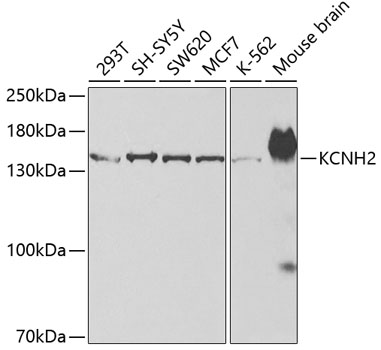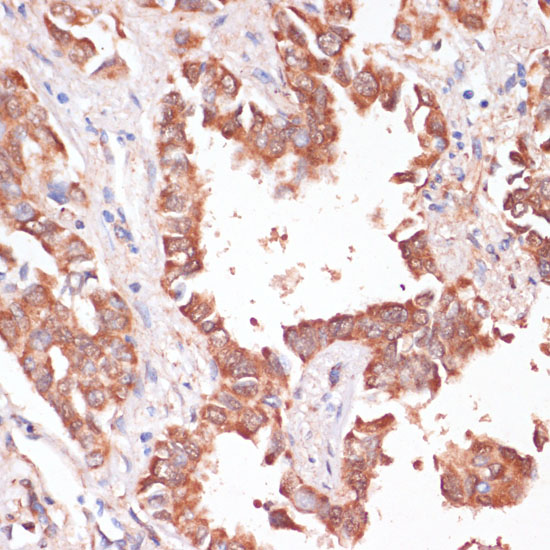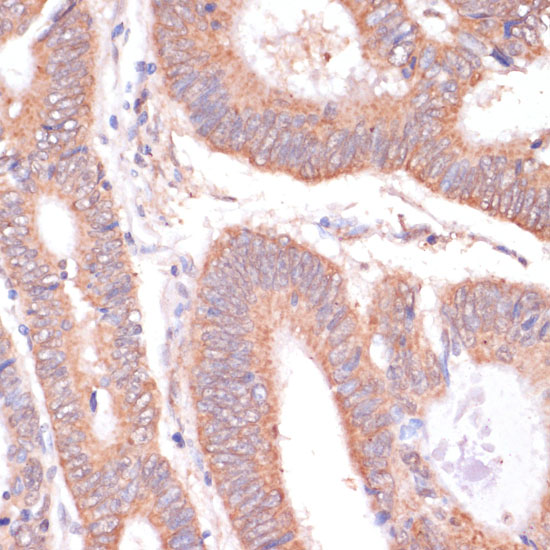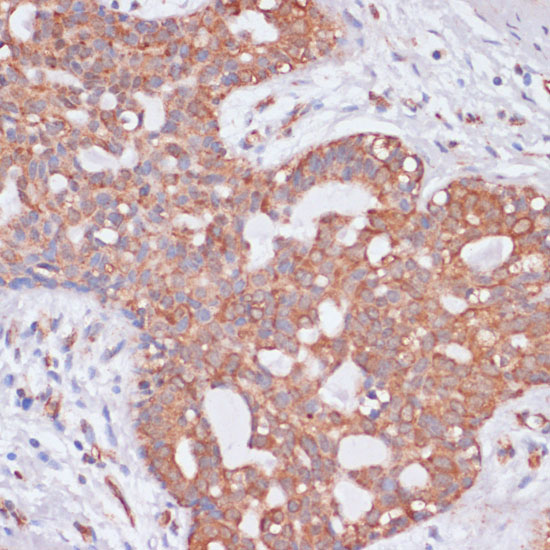Signal Transduction Antibodies 2
Anti-KCNH2 Antibody (CAB2968)
- SKU:
- CAB2968
- Product Type:
- Antibody
- Reactivity:
- Human
- Reactivity:
- Mouse
- Host Species:
- Rabbit
- Isotype:
- IgG
- Research Area:
- Signal Transduction
Description
| Antibody Name: | Anti-KCNH2 Antibody |
| Antibody SKU: | CAB2968 |
| Antibody Size: | 20uL, 50uL, 100uL |
| Application: | WB IHC |
| Reactivity: | Human, Mouse |
| Host Species: | Rabbit |
| Immunogen: | A synthetic peptide of human KCNH2 |
| Application: | WB IHC |
| Recommended Dilution: | WB 1:500 - 1:2000 IHC 1:50 - 1:200 |
| Reactivity: | Human, Mouse |
| Positive Samples: | 293T, SH-SY5Y, SW620, MCF7, K-562, Mouse brain |
| Immunogen: | A synthetic peptide of human KCNH2 |
| Purification Method: | Affinity purification |
| Storage Buffer: | Store at -20'C. Avoid freeze / thaw cycles. Buffer: PBS with 0.02% sodium azide, 50% glycerol, pH7.3. |
| Isotype: | IgG |
| Sequence: | Email for sequence |
| Gene ID: | 3757 |
| Uniprot: | Q12809 |
| Cellular Location: | Cell membrane, Multi-pass membrane protein |
| Calculated MW: | 60kDa/90kDa/97kDa/115kDa/121kDa/126kDa |
| Observed MW: | 148kDa |
| Synonyms: | KCNH2, ERG-1, ERG1, H-ERG, HERG, HERG1, Kv11.1, LQT2, SQT1 |
| Background: | This gene encodes a voltage-activated potassium channel belonging to the eag family. It shares sequence similarity with the Drosophila ether-a-go-go (eag) gene. Mutations in this gene can cause long QT syndrome type 2 (LQT2). Transcript variants encoding distinct isoforms have been identified. |
| UniProt Protein Function: | Kv11.1: the ether-a-go-go related gene is a pore-forming (alpha) subunit of voltage-gated inwardly rectifying potassium channel is associated with cardiac arrhythmias and rhythmic excitability of the pituitary. Channel properties are modulated by cAMP and subunit assembly. Mediates the rapidly activating component of the delayed rectifying potassium current in heart (IKr). The potassium channel is probably composed of a homo- or heterotetrameric complex of pore-forming alpha subunits that can associate with modulating beta subunits. Heteromultimer with Kv11.2 and Kv11.3. Interacts with ALG10B. Heteromultimer with KCNE1 and KCNE2. Defects in Kv11.1 are the cause of long QT syndrome type 2 (LQT2), a heart disorder characterized by a prolonged QT interval on the ECG and polymorphic ventricular arrhythmias. They cause syncope and sudden death in response to exercise or emotional stress. Deafness is often associated with LQT2. Defects in Kv11.1 are the cause of short QT syndrome type 1 (SQT1), a heart disorder characterized by idiopathic persistently and uniformly short QT interval on ECG in the absence of structural heart disease in affected individuals. They cause syncope and sudden death. Four isoforms of the human protein are produced by alternative splicing. Isoform 3 has no channel activity by itself, but modulates channel characteristics when associated with isoform 1. |
| UniProt Protein Details: | Protein type:Membrane protein, integral; Motility/polarity/chemotaxis; Membrane protein, multi-pass; Channel, potassium Chromosomal Location of Human Ortholog: 7q36.1 Cellular Component: voltage-gated potassium channel complex; cell surface; cytoplasm; plasma membrane; nuclear envelope Molecular Function:identical protein binding; voltage-gated potassium channel activity; protein binding; protein homodimerization activity; delayed rectifier potassium channel activity; ubiquitin protein ligase binding; inward rectifier potassium channel activity; two-component sensor activity Biological Process: synaptic transmission; regulation of membrane potential; two-component signal transduction system (phosphorelay); potassium ion homeostasis; regulation of the rate of heart contraction by hormone; cardiac muscle contraction Disease: Long Qt Syndrome 2; Short Qt Syndrome 1 |
| NCBI Summary: | This gene encodes a voltage-activated potassium channel belonging to the eag family. It shares sequence similarity with the Drosophila ether-a-go-go (eag) gene. Mutations in this gene can cause long QT syndrome type 2 (LQT2). Transcript variants encoding distinct isoforms have been identified. [provided by RefSeq, Jul 2008] |
| UniProt Code: | Q12809 |
| NCBI GenInfo Identifier: | 7531135 |
| NCBI Gene ID: | 3757 |
| NCBI Accession: | Q12809.1 |
| UniProt Secondary Accession: | Q12809,O75418, O75680, Q708S9, Q9BT72, Q9BUT7, Q9H3P0 A5H1P7, C4PFH9, D3DX04, |
| UniProt Related Accession: | Q12809 |
| Molecular Weight: | 115,636 Da |
| NCBI Full Name: | Potassium voltage-gated channel subfamily H member 2 |
| NCBI Synonym Full Names: | potassium voltage-gated channel, subfamily H (eag-related), member 2 |
| NCBI Official Symbol: | KCNH2 |
| NCBI Official Synonym Symbols: | ERG1; HERG; LQT2; SQT1; ERG-1; H-ERG; HERG1; Kv11.1 |
| NCBI Protein Information: | potassium voltage-gated channel subfamily H member 2; eag homolog; eag-related protein 1; ether-a-go-go-related protein 1; ether-a-go-go-related gene potassium channel 1; voltage-gated potassium channel subunit Kv11.1; ether-a-go-go-related potassium channel protein |
| UniProt Protein Name: | Potassium voltage-gated channel subfamily H member 2 |
| UniProt Synonym Protein Names: | Eag homolog; Ether-a-go-go-related gene potassium channel 1; ERG-1; Eag-related protein 1; Ether-a-go-go-related protein 1; H-ERG; hERG-1; hERG1; Voltage-gated potassium channel subunit Kv11.1 |
| Protein Family: | Potassium voltage-gated channel subfamily |
| UniProt Gene Name: | KCNH2 |
| UniProt Entry Name: | KCNH2_HUMAN |










